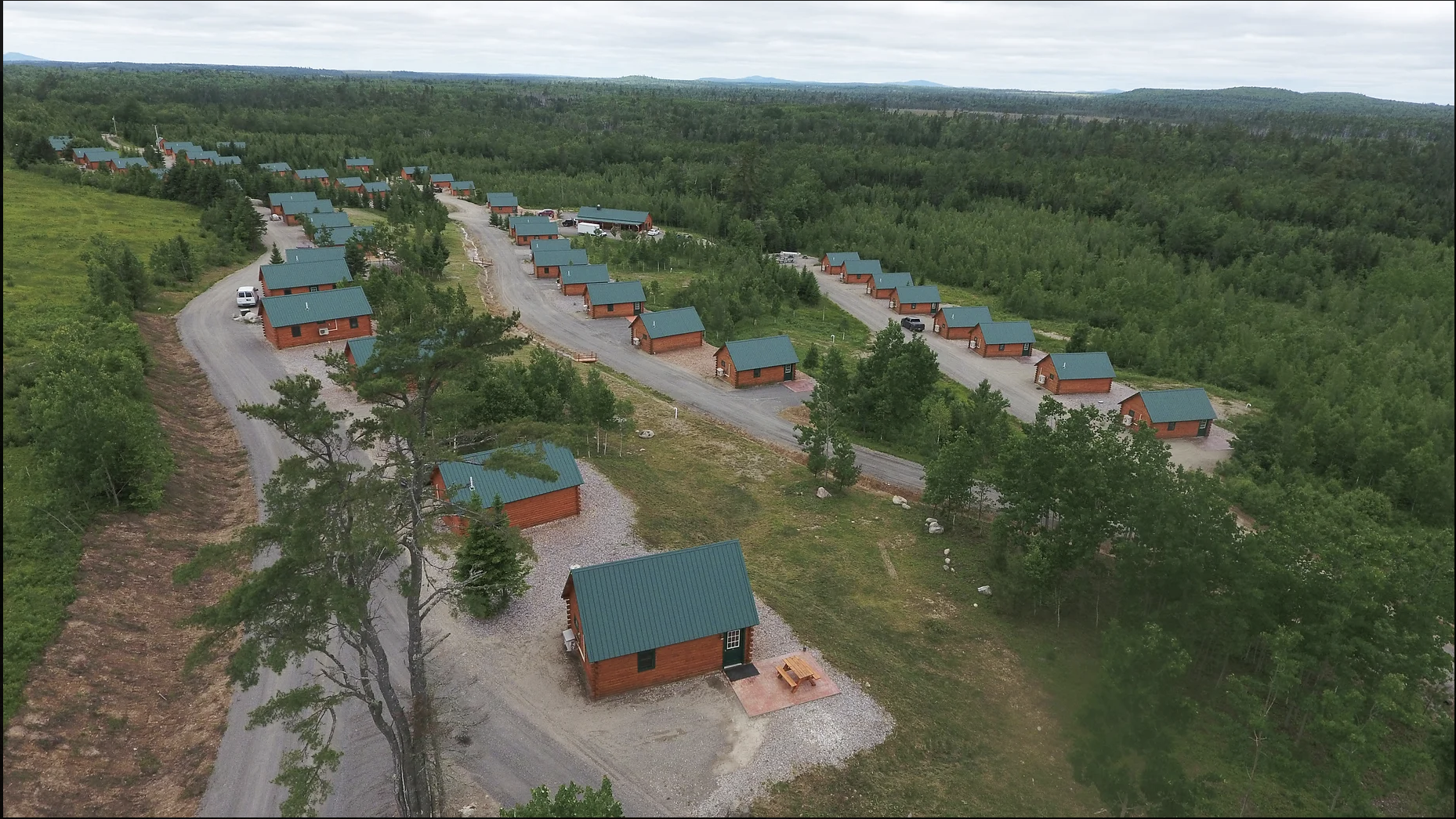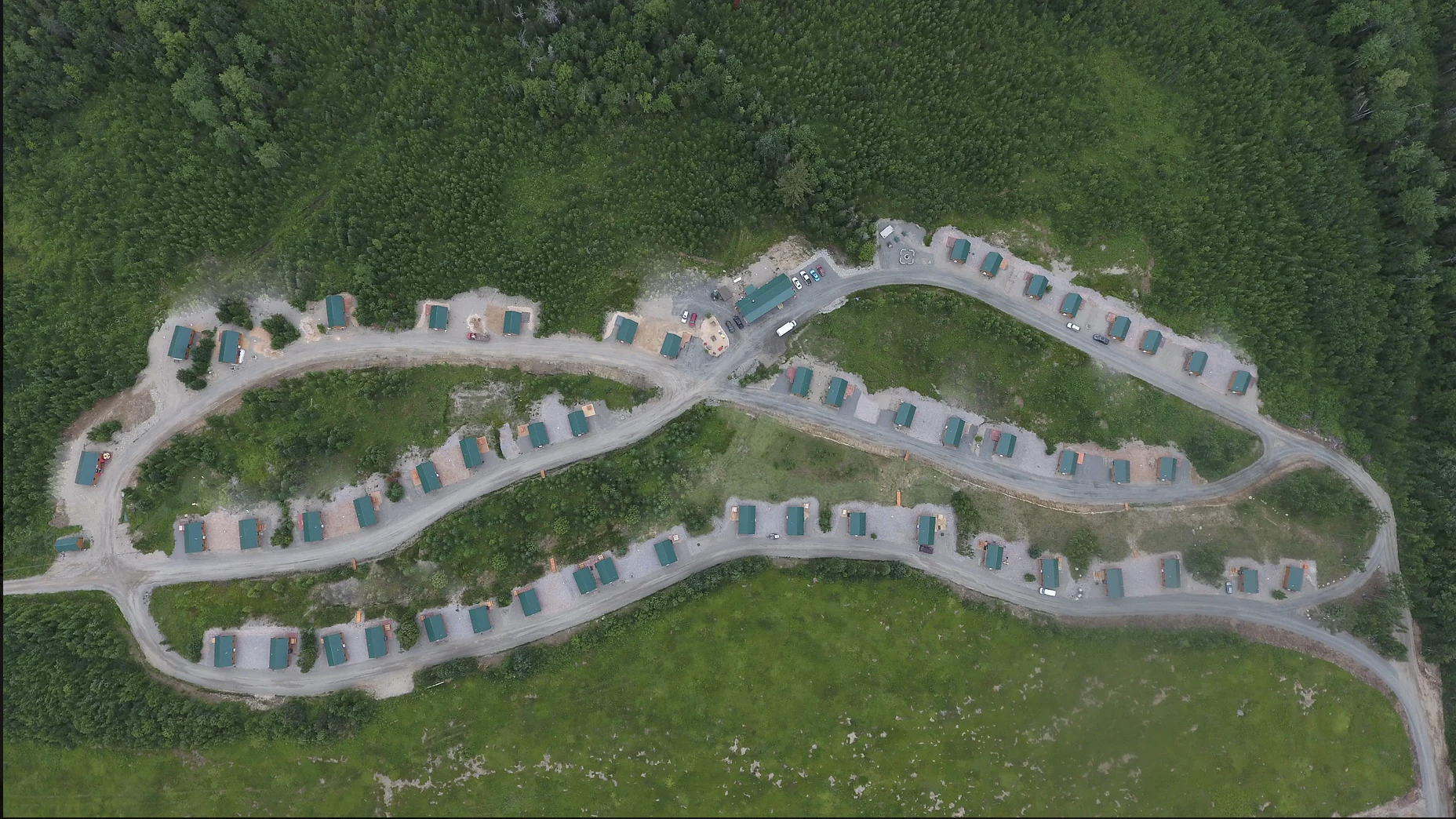After flouting state regulations in 2019 and building an unpermitted campus of 52 cabins in Columbia Falls, the company behind the scrapped Flagpole of Freedom project is paying its resulting fine on time and cleared the first hurdle for its overdue permit.
A consent agreement approved by Maine’s environmental board in late February required Worcester Holdings LLC to submit an after-the-fact site law application and fined the company $250,000 for building its “Flagpole View Cabins” without state permits. The company has paid $63,000 in fines to date.
Worcester cleared the first hurdle of the retroactive permitting process after the Department of Environmental Protection deemed its application complete, said David Madore, the department’s deputy commissioner.
That determination doesn’t free Worcester from the risk of having to raze the cabins and revegetate the land, however.
The company’s application is now under the state’s review and, if denied, Worcester would be required by the consent agreement to clear the campus, including an accompanying restaurant and roads, then implement a restoration plan.
Worcester Holdings, which does business as Worcester Wreath, started building the cabins in 2019 and did not submit site reviews or studies to the DEP before or during construction, Ron Mongeon, director of the DEP’s eastern Maine office, said at a hearing this February.
The company continued to advertise the cabins for rent even after being notified of violations by DEP, and failed to meet a February 2023 deadline to submit an after-the-fact permit application.
When reached by phone on Thursday, a Worcester employee instructed The Monitor reporter to email questions, which the company did not respond to by publication. In a letter circulated to residents of Columbia Falls earlier this year and signed by the Worcester family, a copy of which was obtained by The Monitor, the family said the cabins received local permits but that they “believed the project did not require a DEP permit.”
Members of the state Board of Environmental Protection, the citizen board that oversees DEP, were skeptical that Worcester would be able to recover years-old information they suspected may have been lost to time and marred by construction.
Board members feared that without baseline information on the site’s previous condition, there isn’t a clear image of the development footprint, and regulators wouldn’t be able to tell if developers took special measures during construction to reduce erosion and protect nearby wildlife habitat, especially the habitat of a threatened bird species known to the area.
It’s “kind of hard to resurrect what’s not there anymore now that we’ve buried it,” said Susan Lessard, the board chair, at the Feb. 28 meeting.
After-the-fact permitting of this kind is relatively uncommon in Maine, with only a handful of applications filed each year, according to Dawn Hallowell, licensing director for the DEP’s Land Bureau.
Even though Worcester’s development is already built, Hallowell said the same rigorous standards for on-time site law applications are required of after-the-fact applications.
“There’s no special provision for the fact that it’s already built,” Hallowell told The Maine Monitor in March.
There are various methods for determining a site’s previous condition to meet the required data for a site law application, like remote sensing, Hallowell said. Environmental experts also have the opportunity to return to the site and measure different features, like stormwater management.
“I haven’t really encountered a situation where they were not able to provide the data required for the site law review,” Hallowell said. “Usually they can get it.”
If they can’t, that would be a problem. In that case the Worcesters would have a roughly 30-day window to fill in missing information, Hallowell said.
“And if they can’t, if it’s just not going to work, the department would issue a denial or (Worcester) would have the opportunity to withdraw the application,” Hallowell said. “And the result is kind of the same … they would need to come up with a restoration plan.”
The Department’s completion determination shows that Worcester provided, at minimum, the baseline information required for a review.
At the Feb. 28 board meeting, Lessard, the board’s chair, was especially unsettled by what damages may have occurred and Worcester’s defiance in flouting state regulations.
“It feels egregious to me in the way that the department has been ignored and the lack of information that any of us have to decide if anything that shouldn’t have been disturbed, was disturbed,” Lessard said. “There’s no way for us to know that.”
Board members inquired about what information — if any — DEP staff had on the status of habitat for the upland sandpiper, a tall, thin bird that thrives in grasslands and barrens.
The upland sandpiper has a ‘threatened’ status in Maine and has been documented in the area of the Flagpole View Cabins development, according to the Maine Department of Inland Fisheries and Wildlife.
In a letter regarding Worcester’s development, Inland Fisheries and Wildlife staff wrote that upland sandpipers are acutely sensitive to imposing structures within their habitat. The birds “are among the rarest” in the Northeast, according to the agency.
Resource biologist Ciara Wentworth added that had the department been consulted before construction, it would have suggested a number of safeguards — like mapping the bird’s nesting activity and creating buffers around those areas, as well as pausing construction during its mating season through spring and summer.
Instead, Wentworth wrote, “Given that construction has already occurred immediately adjacent to upland sandpiper habitat, we anticipate there were direct and indirect (displacement) impacts to this species during the construction phase.”

How much disturbance occurred is unknown because of the lack of mapping, Wentworth said, and could continue with the presence of the structures. The department recommended Worcester hire a biologist to assess habitat loss and, as part of the permit review, compensate any one acre of habitat lost to development with eight acres of grassland.
Laura Minich Zitske, a wildlife ecologist for Maine Audubon, told The Monitor at the time that she was surprised but grateful for the enforcement action DEP took and the role Inland Fisheries and Wildlife has during the permit review to elevate these habitat-protecting protocols.
“It’s quite atypical for DEP and IFW to respond in this way, but normally people don’t just do these large-scale construction operations without permitting,” Zitske said. “There are a lot of things that we can do to make sure that we can use the property while still accommodating wildlife.”







